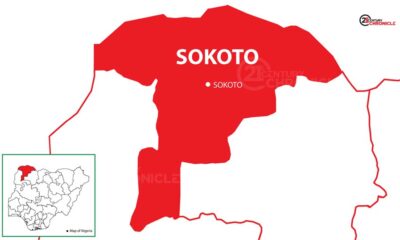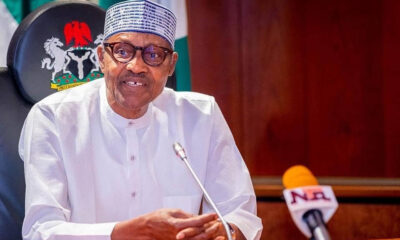News
We’re addressing poverty, youth unemployment to tackle insecurity – Buhari
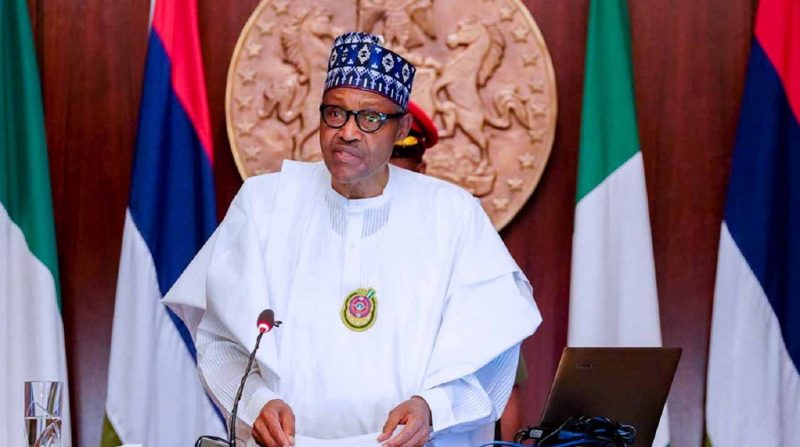
President Muhammadu Buhari says his administration has begun to address the twin problem of poverty and youth unemployment fuelling insecurity in the country.
He also said the daunting security challenges had not consumed the nation due to the Nigerians’ can-do spirit.
These are part of his address to the nation this morning to mark the 2021 Democracy Day, which his administration shifted from May 29 to June 12 in memory of Chief MKO Abiola, who won the 1993 presidential election but was annulled by the ruling government then and he eventually died in detention.
The President said, “In the last two years, we have witnessed and overcome a good number of testy challenges that would have destroyed other nations especially relating to our collective security.
“The indefatigable can-do spirit of the Nigerian has sustained us and would keep pushing us to put these challenges behind us.
“Unfortunately some of these challenges came in the shape of violent outrages leading to the loss of lives of many of our dear compatriots and the destruction of some of our infrastructure, including those devoted to improving our democratic processes.”
He expressed worry of the persistent attacks, abduction and killing of innocent people by terrorists and hoodlums, adding that his administration would move against the perpetrators and their sponsors.
He said, “Let me assure my fellow citizens that every incident, however minor, gives me great worry and concern and I immediately order security agencies to swiftly but safely rescue victims and bring perpetrators to justice.
“ When you elected me as your President in 2015, you did so knowing that I will put an end to the growing insecurity, especially the insurgency in the North East, but the unintended consequences of our scattering them in the North East pushed them further in-country which is what we are now facing and dealing with. We will, by the Grace of God put an end to these challenges too.
“Unfortunately, like in most conflict situations, some Nigerian criminals are taking undue advantage of a difficult situation and profiteering therefrom with the misguided belief that adherence to the democratic norms handicaps this Administration from frontally and decisively tackling them.”
The President said the FG was already addressing the twin underlying drivers of insecurity – poverty and youth unemployment.
“Interventions led by government and the Central Bank of Nigeria driving economic growth over the past six years are targeted mostly to the agricultural, services, infrastructure, power and health care sectors of the economy.
“In the agricultural sector, for instance, the Anchor Borrowers Programme resulted in sharp decline in the nation’s major food import bill from $2.23 billion in 2014 to $0.59 billion by the end of 2018,” he said.
Specifically, the President said his administration had assisted many farmers, artisans and small-scale business owners, with a total of 10.5 million Nigerians saved from poverty in the last two years.
Buhari said, “In the last two years we lifted 10.5 million people out of poverty – farmers, small-scale traders, artisans, market women and the like.”
The President said his administration remained strongly committed to lifting 100 million Nigerians out of poverty in 10 years.
“I will be the first to admit that in spite of our efforts and achievements which are there for all to see, there is still much more to be done and we are doing our best in the face of scarce resources and galloping population growth rate that consistently outstrips our capacity to provide jobs for our populace. Our over-all economic target of lifting 100 million Nigerians out of poverty in 10 years is our goal notwithstanding COVID-19.
“I am very convinced that the 100 million target can be met and this informed the development of a National Poverty Reduction with Growth Strategy. The specific details of this accelerated strategy will be unveiled shortly.”
Buhari disclosed that his administration disbursed N5,000 to one million Nigerians using a rapid response register and advanced N20,000 to 750,000 beneficiaries of the conditional cash transfer progamme and provided 1.37 million Nigerians with palliatives from the Coalition Against COVID-19 (CACOVID), a private sector-led organisation established to assist the government in combating COVID-19 pandemic.”
Buhari said his administration was not opposed to constitutional reform as part of our nation building process, noting that everyone must understand that the primary responsibility for constitutional amendments lies with the national assembly.
“This body which, as I said, is the arm of government responsible for constitutional changes has concluded the preliminary stages of amending and improving our constitution in a way that the majority of Nigerians will be happy with.
“Government is, however, willing to play a critical role in the constitutional amendment process without usurping the powers of the National Assembly in this regard.”
News
Nigeria will stop fuel importation by June – Dangote
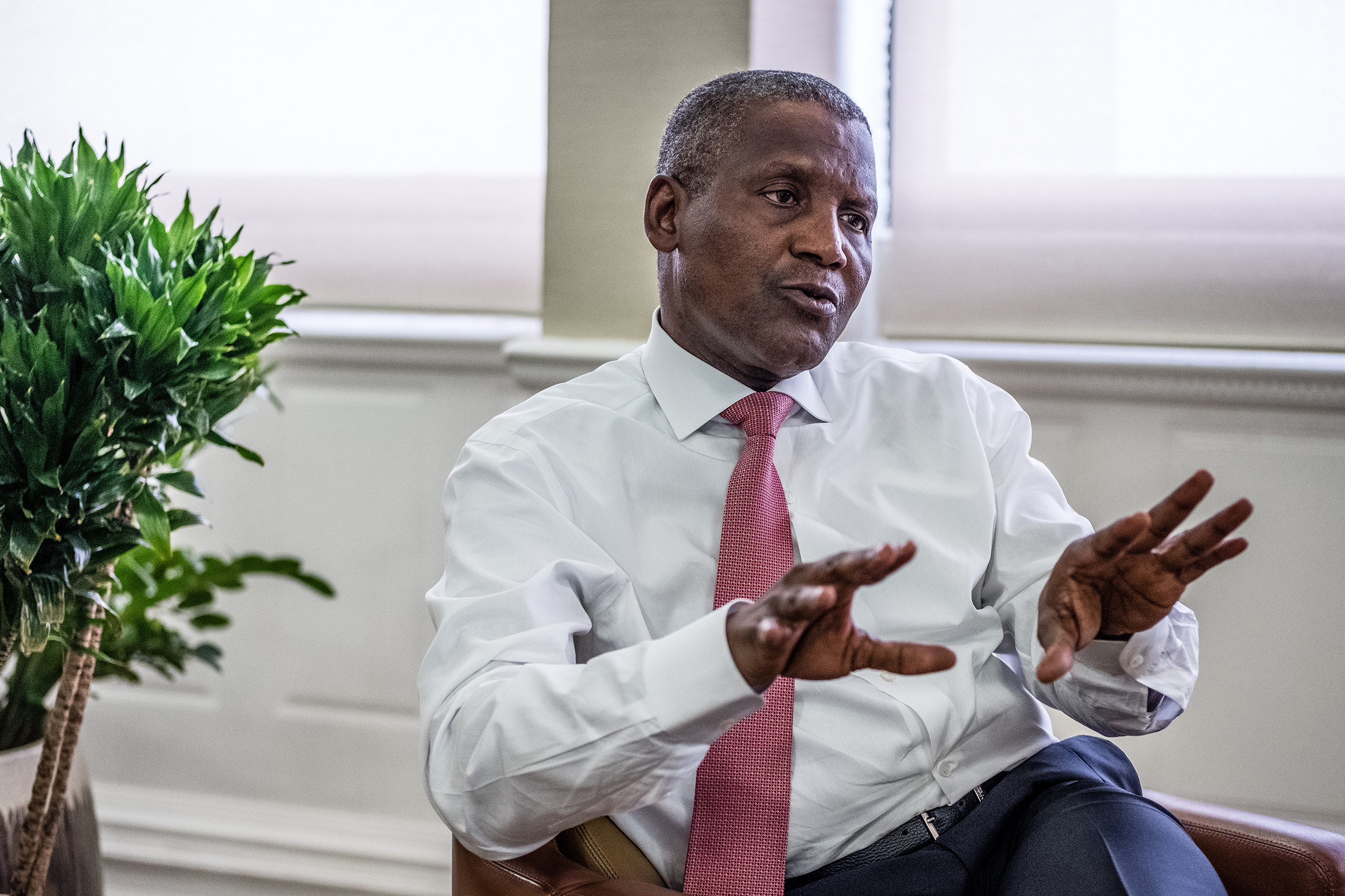
Nigeria will stop fuel importation by June – Dangote
Aliko Dangote, Africa’s richest person, has announced that Nigeria will cease importing petrol by June.
Speaking at the Africa CEO Forum Annual Summit in Kigali, Dangote revealed that his refinery will commence production next month, meeting Nigeria’s petrol needs and eliminating the need for imports.
“Right now, Nigeria has no cause to import anything apart from gasoline and by sometime in June, within the next four or five weeks, Nigeria shouldn’t import anything like gasoline; not one drop of litre,” he said.
The refinery will also produce diesel, aviation fuel, and other essential products, making Africa self-sufficient in these commodities.
READ ALSO:
- Rainstorms kill seven, many others injured
- Olanipekun, Yayale, Elechi, Yusuf Ali, others named higher institutions’ governing council chairmen
- Nearly 10,000 evacuated in Ukraine’s Kharkiv region after Russia attack
With a capacity of 650,000 barrels per day, the refinery will meet the demands of West Africa and beyond.
Dangote emphasized that the refinery will not only focus on petroleum products but also produce polypropylene, polyethylene, base oil, and linear benzyl, raw materials essential for producing detergents and other products.
This will reduce Africa’s reliance on imports and make the continent self-sufficient in these critical products.
Dangote expressed his optimism that within three to four years, Africa will no longer need to import fertilizers, as his refinery will produce urea, potash, and phosphate, meeting the continent’s needs.
The refinery’s second phase is set to begin early next year, further expanding its operations and impact on Africa’s energy landscape.
Nigeria will stop fuel importation by June – Dangote
News
Olanipekun, Yayale, Elechi, Yusuf Ali, others named higher institutions’ governing council chairmen
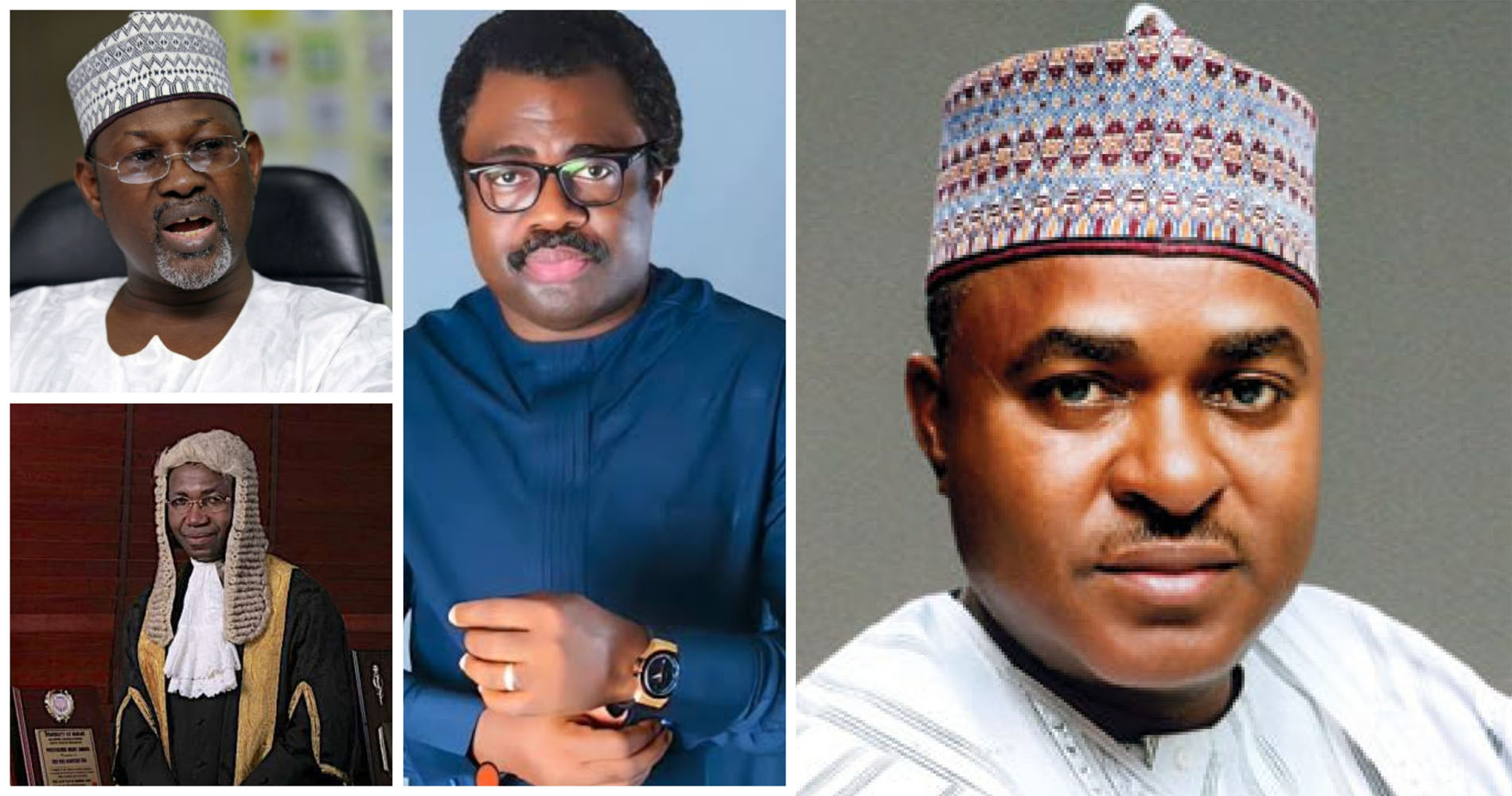
Olanipekun, Yayale, Elechi, Yusuf Ali, others named higher institutions’ governing council chairmen
President Bola Tinubu’s administration has unveiled a list of appointees to the governing councils of 111 federal universities, polytechnics, and colleges of education.
Notable figures among the appointees include former Independent National Electoral Commission (INEC) Chairman, Attahiru Jega; Senior Advocates of Nigeria Wole Olanipekun, former Bauchi governor, Isa Yuguda, and Yusuf Alli.
Others are former National Universities Commission Executive Secretary, Peter Okebukola; and labour activist, Issa Aremu. The individuals have been selected to lead the councils of various academic institutions across the country.
The announcement follows a recent ultimatum issued by the Academic Staff Union of Universities (ASUU), which demanded the Nigerian government address issues such as the alleged illegal dissolution of university governing councils and the continued use of the Integrated Payroll and Personnel Information System (IPPIS) for salary payments.
The Federal Ministry of Education responded by assuring that these concerns were being handled and that the list of council members would be released soon.
The appointments, signed by Permanent Secretary Didi Walson-Jack of the Federal Ministry of Education, include five representatives each for 50 universities, 37 polytechnics, and 24 colleges of education.
READ ALSO:
- Nearly 10,000 evacuated in Ukraine’s Kharkiv region after Russia attack
- Police inspector dismissed over ‘N29.8m theft’, three other officers demoted
- Russia could increase Ukraine attacks, says Zelensky
Specifically, Attahiru Jega has been appointed Chairman of the Governing Council of Usmanu Danfodio University, Sokoto. Wole Olanipekun will chair the University of Lagos, while Yusuf Alli takes on the Federal University of Agriculture, Abeokuta.
Peter Okebukola will lead the University of Port Harcourt, and Issa Aremu will head the Federal College of Education (Technical) in Keana, Nasarawa State while Yuguda will chair the National Open University of Nigeria (NOUN).
Furthermore, former Senator Joy Emordi will lead Alvan Ikoku Federal University of Education in Owerri; and former Secretary to the Government of the Federation, Yayale Ahmed, will head the council of Ahmadu Bello University in Zaria.
Adamu Rasheed, the immediate past Executive Secretary of the NUC, has been appointed to the Federal University of Health Sciences, Otukpo in Benue State.
The new governing council members are scheduled for inauguration and a retreat on May 30 and 31 at the National Universities Commission’s headquarters in Abuja.
In June 2023, President Tinubu dissolved the governing councils of several key government agencies and higher education institutions, a move that sparked criticism from various stakeholders. They argued that the University Miscellaneous Act grants universities and their councils autonomy to self-regulate.
Olanipekun, Yayale, Elechi, Yusuf Ali, others named higher institutions’ governing council chairmen
News
UK lawmaker lauds EFCC, says Africa underestimates its strength
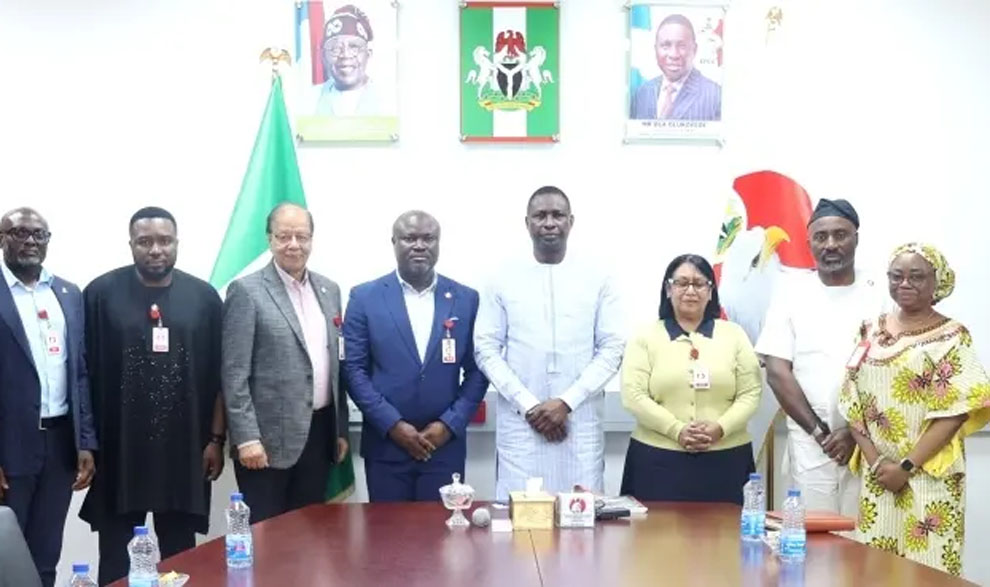
UK lawmaker lauds EFCC, says Africa underestimates its strength
In a significant boost to Nigeria’s anti-corruption efforts, the Economic and Financial Crimes Commission (EFCC) has received international recognition for its tireless work in tackling corruption.
Baroness Verma Sandy of Leicester, a member of the United Kingdom’s House of Lords, has commended the EFCC for its dedication to fighting corruption and promoting good governance in Nigeria.
During a visit to the EFCC headquarters in Abuja on Friday, Baroness Verma Sandy praised the Commission’s new leadership under Executive Chairman, Mr. Ola Olukoyede, for repositioning the organization on the path of professionalism and effectiveness.
She expressed confidence that the EFCC’s efforts would help change the global perception of Africa and build new confidence in the continent.
The Baroness, who led a six-man delegation of the UK-based African Leadership Organisation, acknowledged the EFCC’s efforts in shaping better narratives for Nigeria and praised the Commission’s innovative approaches to tackling corruption.
She emphasized the importance of international collaboration in the fight against corruption and encouraged the EFCC to continue its good work.
Sandy said: “We are so glad to be here. It is important having this organization led by somebody who has brought incredible positive changes to the country. And I want to thank all of your colleagues here for engaging with us today. I believe passionately on the strength of the African Continent. I am not connected at all to Africa, but I have been a champion for a continent that has under-estimated its own strength but has got so much to offer the world. And I think your organization will help change the perceptions and build new confidence. So, I am so pleased and honoured to be here.”
READ ALSO:
- We’re impressed by Tinubu’s security strategies – UK Govt
- Don’t involve Bello’s children in corruption fight, rights group tells EFCC
- Only my party can stop me from contesting 2027 presidential election – Atiku
EFCC Chairman, Mr. Olukoyede, thanked the Baroness and her delegation for identifying with the Commission and acknowledging its efforts.
He reiterated the EFCC’s commitment to tackling corruption and promoting good governance, emphasizing that corruption is a major obstacle to Africa’s development.
He highlighted the Commission’s new focus on prevention and addressing systemic issues that enable corruption, as well as its efforts to stimulate economic growth and prevent foreign exchange sharp practices.
-

 Business3 days ago
Business3 days agoDollar crashes against Naira at official market
-

 News2 days ago
News2 days agoUsing pre-registered SIM card may land you in jail, NCC warns
-

 metro3 days ago
metro3 days agoThree police officers sentenced to life imprisonment in Anambra
-
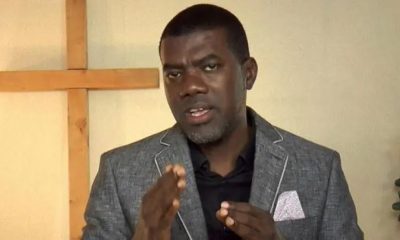
 News3 days ago
News3 days agoWike, Fubara are ego-driven, crude – Reno Omokri
-

 metro1 day ago
metro1 day agoFire guts new NNPCL tank farm in Lagos
-

 International2 days ago
International2 days agoUK says it’s developing radio frequency to blast out drones
-

 News2 days ago
News2 days agoUpdated: Reps condemn assault on Nasarawa female doctor by patient family
-

 News2 days ago
News2 days agoPolice grill Osun monarch, Ataoja of Osogbo, over petition

